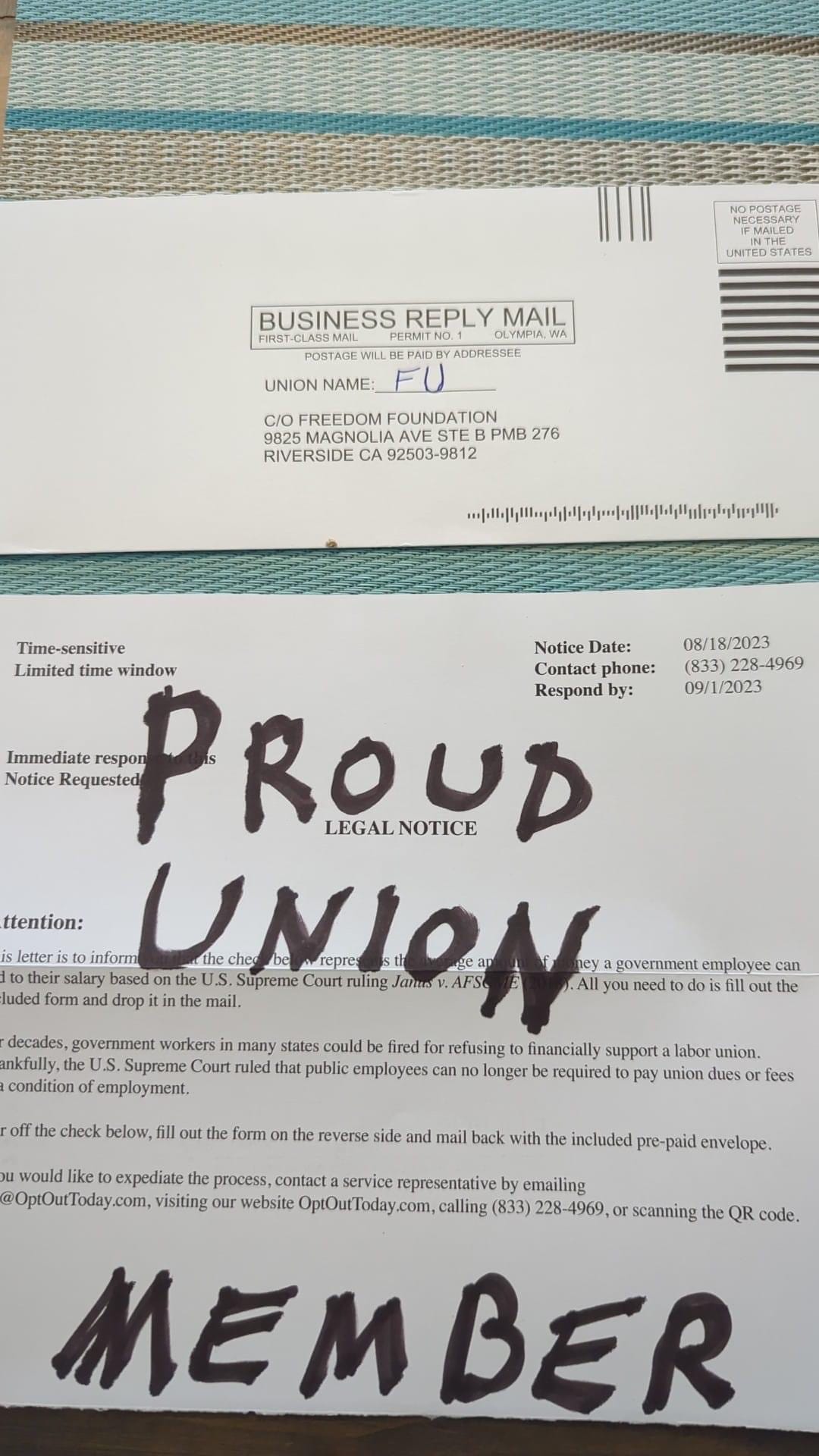The Not So Secret (But Still Widely Unknown) Life of All Unionized Teachers in the Era of Janus
by Brian Lees
This will be the last piece in this series for a while, as it will be on hiatus until the school year is well underway in the fall. It is my hope these worker stories provided a solid and diversified glimpse into the various challenges that many teachers have faced over the past few decades and the roles that union membership have played in their lives.
Speaking of union membership, this “season finale” piece is a departure from the format of most of the previous pieces in this series in order to focus solely on the subject of what it means to many of our teachers to belong to their union and pay their union dues in the era of the Janus decision.
Just over 6 years ago, the Supreme Court issued a 5-4 decision in Janus v. American Federation of State, County, and Municipal Employees Council 31 that overturned decades of precedent, with the court holding that union fees violate “the free speech rights of nonmembers by compelling them to subsidize private speech on matters of substantial public concern.”
At the time of the decision, education workers made up more than half of the 17.3 million people in state and local government jobs (approximately 8.8 million in 2018, 6.9 million of whom worked in elementary and secondary schools alone). In 2018, it was estimated that teachers earned, on the average, approximately 77 percent of what other college graduates earned in weekly wages. With the Janus decision’s swipe at collective bargaining rights, the trend of eroding union power in the United States continued in the wake of Wisconsin’s landmark Act 10 in 2011, which resulted in accelerated teacher turnover and a massive shrinkage in teacher experience (in just 12 years after the decision, the percentage of teachers with less than 5 years of experience has risen from 19.6 percent to 29.1 and the percentage of teachers leaving the profession nearly doubled). Notable teacher strikes in Oklahoma and West Virginia shortly before the Janus decision highlighted the only recourse teachers had in states without strong collective bargaining rights in order to improve, and in some cases, merely preserve their wages and benefits.
“The Janus decision is a direct threat to our ability to advocate for the pay, benefits, and working conditions that we need to get our important work done,” said California Federation of Teachers President Joshua Pechthalt in response to the decision. “By seeking to eliminate our ability to advocate for our jobs, our schools, and our vital public services, those behind the Janus case directly threaten the public education system and the students and families that we serve. The decision also hurts the ability of the entire labor movement to defend vital social services such as Social Security and Medicare.”
“California teachers and school workers are fiercely dedicated to our students and their families because we believe in the power and promise of public education to transform lives and to lift up communities,” continued Joshua Pechthalt. “We know that the best way to protect our students and our schools is to stand together to raise standards for our profession and support for our schools and vital public services. And we are not going to back down, regardless of the Supreme Court’s decision in the Janus case.”
While the Janus decision was lauded by some as an outstanding example of democracy and preservation of personal freedom at its finest, it didn’t take long for the entities who despise unions, such as the California Policy Center and the Freedom Foundation, to swoop in and try to shake loose the strong hold on collective bargaining rights so many of our unions have enjoyed. In particular, teachers have been targeted with mailers promising increased wages (anywhere from $800 to $1,000) and containing mock-up checks if they sign up to rescind their union membership. This is a very clever approach, as teachers are often quite vulnerable to this ploy and are always looking for ways to boost their personal income or even have more funds at their disposal to purchase much-needed and often under-funded supplies for their classrooms and students.
These mailers, examples of which I have received, along with several of my teaching colleagues, at least a dozen times now over the past five years, are pictured below:
Reactions to these mailers have been varied; I have talked to colleagues who have rescinded their membership and realized savings, while others have responded with a more entertaining rebuttal as pictured above. The vast majority of our members have simply ignored it, trashed it, or in my case, shredded itc, with some degree of satisfaction.
It is possible that many who have fallen for this ploy in order to gain temporary and immediate minimal financial gain have the same short-sighted view of the Keynesian economists I studied during my days as an economics major in the California State University System: might as well have it now, because, as Keynes once wrote in his 1923 publication, The Tract on Monetary Reform, “In the long run, we are all dead.” They do not see the long-term implications of such a decision; without strong collective bargaining rights, their salaries for numerous years, which also affects their retirement, as well as the defense of their benefits in the era of skyrocketing costs, is at risk and could prove far costlier down the road.
However, with few exceptions, our members see the value of their union and membership in it. The constant pressure from parents, administration, and a litigious society makes union membership for most of our teachers an obvious necessity. These anti-union entities have even started to attack that last benefit, the legal security that unions provide, with a renewed campaign to direct teachers to pre-paid legal plans they can sign up for that these entities claim cost less than a year’s worth of union dues.
Like me, most of my colleagues do see the proverbial handwriting on the wall: this is hardly an attempt to inform teacher’s union households of their freedoms and rights; it’s an active campaign to entice them to quit their union in order to enhance the political clout and economic power of those who despise unions and what they do to protect workers. Our union membership has dropped by less than 2% (approximately 30-35 members) since the Janus decision, with a handful of those dropping citing dissatisfaction with the union’s handling of COVID concerns or other issues as the reason, as opposed to it being a direct result of Janus. Nevertheless, we must be vigilant in our defense of the strength and integrity of our teacher’s unions, as the anti-union sentiment and attacks will surely intensify and the future of quality public TK-12 education depends upon it.
See you next “season” with more worker stories from our teachers.
Brian Lees is a 28-year veteran public elementary school teacher currently teaching 5th grade at a school in the Sabre Springs neighborhood of the Poway Unified School District. During his time as an educator, he has spent 25 of those years as a school site union representative, the last five years as a delegate from his union to the San Diego-Imperial Counties Labor Council, many months as a key organizer of frequent food distributions in conjunction with the Labor Council and Palomar College during the height of the COVID pandemic (June 2020 to November 2021), and most recently was appointed as the Secretary of the COPE Committee for his union, the Poway Federation of Teachers (AFT Local 2357). The son of two retired teachers who also volunteered their time as union leaders, one as a site rep in San Bernardino City Schools and the other as an executive director in Associated Teachers of Metropolitan Riverside, he comes from a long line of educators and active pro-labor advocates. He lives in northeast Escondido with his two dogs and 8-year-old daughter, and his hobbies include reading, writing, composing music, and photography, the last of which he hopes to share in future issues of The Jumping-Off Place, in a photo essay series called “My Esco.”




